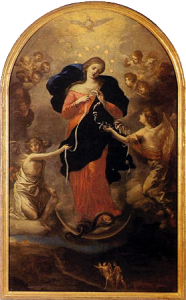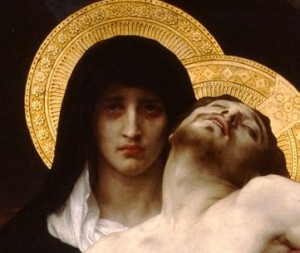
I have a favorite prayer card of the Blessed Mother, it features a painting by Johann Schmittdner, it is called “Mary Undoer of Knots.” For all their beauty, many depictions of the Blessed Mother present a woman I can’t relate to. No critique of the artists, art is subjective, it either speaks to our heart or it does not. I know what I like about the Schmittdner painting, the warm colors, and our Lady is painted as a woman of substance, with curves and real hips. Her hair is dark and thick, pulled back from her face, and she is intent on her work. There is an earthiness to this woman, she looks like she could have carried water from wells, helped Joseph when he needed an extra hand to hold a piece of wood, sweet featured, a woman of strength. I like William-Adolphe Bouguereau also, my favorite is his “Pieta,” I get lost in her eyes. Those are the eyes of a bereaved mother, of a heart so broken it will never mend. Look at how red her eyes are, the tears that track down her face, her swollen eyelids. I read that Bouguereau suffered the death of three of his five children and the death of his young wife. I cannot help but think that the pain engraved on his wife’s face imprinted upon his heart, and from that place of pain he painted. Compare the innocence and unlined beauty of his paintings of the Blessed Mother holding her infant son, then with the “Pieta”, she has intimate knowledge now of death and suffering.
I think of the hidden years that Jesus and Mary had together, how her heart must have near burst for love of Him, did he tease her, were the village children always at their house because it was filled with love and laughter? Was he quiet with shadowed eyes at times, would her own heart catch with an unspoken, unseen apprehension? I think of when he had to leave her, perhaps she traveled with him as he walked the countryside with his disciples, but it would never be the same as the just the two of them at home.
Did she do what moms do when we have to say goodbye to our sons? Did she smile, and choke back tears because you never want them to think that they can’t manage on their own, that they cannot achieve what they are setting out to do? You don’t want their last memory of you to be one of tears, so you smile, you tell them that you love them, that you are proud of them. You go through the litany of all the things they need to remember, please remember to eat, please remember to stay warm, please be safe. Did he take her face in his hands and kiss her forehead, did he smile and choke back tears because he needed her to know that she could manage on her own, that she could let go his of hand? And when he left did she try to tidy up and couldn’t see for her tears, did she sink down to the floor and cry because the house seemed so empty?
She was fully human, fully a mother, pure of heart, would not her heart hurt even more? How she must have watched his ministry those three years, catching glimpses of him when she could, a moment here and there before they were again separated. The rumors, the political unrest, how heavy her heart must have been at times. And then the arrest, the trial, the flogging, and then they met as he carried his cross. Did she smile as her heart broke and the acid rose in her throat, did she smile as her knees shook, as she screamed inside her head for this all to stop, did she smile through her tears? Did she smile so that he knew he could accomplish his mission, did she smile and tell him that she loved him, that she was proud of him, did she smile so that he knew she would be alright without him?
She stood by him at the cross and watched him die, was she calm on the outside while terror gripped her heart? Did anger rise up in her, did the pain in her head feel like a vise growing tighter and tighter? And when she held his lifeless body did she think of him as an infant, as a nestling toddler, was she unable to catch her breath for the pain?
I think of Mary and her grief. Some say she did not grieve because of the resurrection, Jesus rose from the grave, and ascended to heaven, that she was at peace and joyful, so perfectly embracing God’s will for her that she felt only peace. I struggle with that line of thought. Did she not have to process what she witnessed, did she not grieve as any human mother would grieve? Were there not times when she was alone that great sobs shook her body, that she saw over and over again in her mind’s eye his pain? Would she have not mourned for his company, to see his face, laugh with him, walk with him, to cook him all his favorite foods? Was she not exhausted for months afterward? Did she keep something that still had his sweet scent close to her? She was human, would she not have experienced the very normal and natural process of grieving the death of her child?
I see her with hands that knew hard work, worn and chapped by labor and sun. Long dark hair that was forever escaping and blowing in front of her eyes. I don’t have a sense that she would scorn my grief or be impatient with my sorrow. She would have little to say actually, for she knows there are no words. She understands the silence, the darkness, so she sits quietly with her basket of work. She gently works out the knots and snarls in the ribbons we hand to her. She knows what knot has to be loosened first, and slowly she works out each knot with a patience borne of what she has suffered.




Terri-
This is one of my favorite pieces that you have written. I have always thought of her as ‘a woman of substance” too. She was not frail- she is strength. And as a human, although she accepted God’s will…. she, I believe, would have mourned like you for the loss of her beloved son. She would have had a yearning for sweet and happy times in her memory. She would, like you, have kept on loving her son. Perhaps she is teaching us that death- though it brings mournful change- does not separate us. Love to you! Liz
Awesome write/share Terri … I am sure she grieved every ounce, as do you & I & others, in our loss.
Big hugs, Marydon